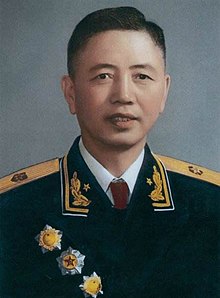Liu Huaqing
Liu Huaqing | ||
|---|---|---|
刘华清 | ||
 | ||
| Vice-Chairman of the Central Military Commission | ||
| In office State Commission: 28 March 1993 – 5 March 1998 Party Commission: November 1989 – 18 September 1997 | ||
| Chairman | Jiang Zemin | |
| Commander of the People's Liberation Army Navy | ||
| In office August 1982 – January 1988 | ||
| Preceded by | Ye Fei | |
| Succeeded by | Zhang Lianzhong | |
| Personal details | ||
| Born | 1 October 1916 Hanyu Pinyin | Liú Huáqīng |
Liu Huaqing (Chinese: 刘华清; 1 October 1916 – 14 January 2011)[1] was a Chinese revolutionary and an admiral of the People's Liberation Army Navy, who served as the third Commander-in-Chief of the Navy from 1982 through 1988. He is considered to have greatly contributed to the modernization of the Chinese Navy, and is hailed as the "father of the modern Chinese Navy" and "father of Chinese aircraft carriers".
Biography
Taking over the role of Navy Commander-in-Chief from his predecessor
Liu encouraged technological innovation within China that would increase naval capabilities, but he also advocated large foreign purchases. During the 1960s and 1970s, Liu was responsible for naval research and development before heading national military research.
Liu remained active through the mid-1990s and appeared in uniform at 2007 commemorations of the 80th anniversary of the founding of the People's Liberation Army in Beijing. He also appeared in Beijing during the 60th anniversary of the People's Republic of China on October 1, 2009.
Liu died on 14 January 2011 in Beijing.[5] His son Liu Zhuoming is a vice admiral of the PLA Navy.[6] His daughter Liu Chaoying, a former lieutenant colonel in the PLA, was a major figure in the 1996 United States campaign finance controversy.[7]
References
- ^ "人民网--404页面". Archived from the original on 23 February 2011. Retrieved 24 May 2018.
- JSTOR 23257908.
- JSTOR 23613016.
- ^ Wu Renhua (吴仁华) (2009). 六四事件中的戒严部队 [The Martial Law Force in the Tiananmen Square protests of 1989] (in Chinese). Hong Kong: Truth Publishing House.
- People's Daily Online. 14 January 2011. Retrieved 14 January 2011.
- ^ Becker, Jeffrey; Liebenberg, David; Mackenzie, Peter (December 2013). "Behind the Periscope: Leadership in China's Navy". Defense Technical Information Center. p. 176. Archived from the original on 20 November 2015.
- ^ Liu's Deals With Chung: An Intercontinental Puzzle Washington Post, 24 May 1998. Retrieved 10 November 2020.
External links
- (in Chinese) Biography of Liu Huaqing
- Ruminations about how little we know about the PLA Navy. Conference on Chinese Military Affairs, 10 October 2000
